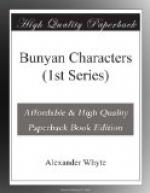and appeal is the whole outward world to the mind
and heart of man, and so sensitive and instantly responsive
is the mind and heart of man to all the approaches
of the outward world, that the mind and heart of man
are constantly full of all kinds of passions, both
bad and good. And, then, this is our present
life of probation and opportunity, that all our passions
are placed within us and are committed and entrusted
to us as so many first elements and so much unformed
material out of which we are summoned to build up
our life and to shape and complete our character.
The springs of all our actions are in our passions.
All our activities in life, trace them all up to
their source, and they will all be found to run up
into the wellhead of our passions. All our virtues
are cut as with a chisel out of our passions, and
all our vices are just the disorders and rebellions
of our passions. Our several passions, as they
lie still asleep in our hearts, have as yet no moral
character; they are only the raw material so to speak,
of moral character. Our passions are the life
and the riches and the ornaments of human nature, and
it is only because human nature in its present estate
is so corrupt and disordered and degraded, that the
otherwise so honourable name of passion has such a
sinister sound to us. And the full regeneration
and restitution of human nature will be accomplished
when every several passion is in its right place,
and when reason and conscience and the Spirit of God
shall inspire and rule and regulate all that is within
us.
’On life’s vast ocean
diversely we sail,
Reason the card, but passion is
the gale.’
And not Elijah only, as James says, and not Paul and
Barnabas only, as they themselves said, were men of
like passions with ourselves, but our Lord Himself
was a man of like passions with us also. He took
to Himself a true body, full of all the appetites
of the body, and a reasonable soul, full of all the
affections, passions, and emotions of the soul.
Only, in Him reason and conscience and the law and
the Spirit of God were the card and the compass according
to which He steered His life. We have all our
ruling passion, and our Lord also had His. As
His disciples saw His ruling passion kindled in His
heart and coming out in His life, they remembered
that it was written of Him in an old Messianic psalm:
’The zeal of Thine house hath eaten me up.’
They were all eaten up of their ruling passions also.
One of ambition, one of emulation, one of avarice,
and so on,—each several disciple was eaten
up of his own besetting sin. But they all saw
that it was not so with their Master. He was
eaten up always and wholly of the zeal of His Father’s
house, and of absolute surrender and devotion to His
Father’s service, till His ruling passion was
seen to be as strong in His death as it had been in
His life. The Laird of Brodie’s Diary
has repeatedly been of great use to us in these inward
matters, and his words on this subject are well worth




